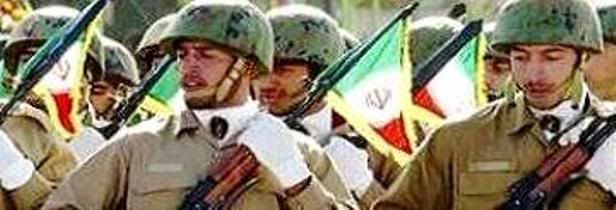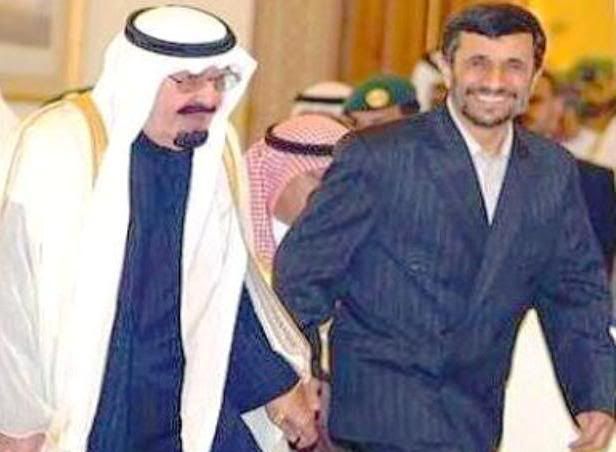As for US President George W Bush, he had just spoken praising Maliki for waging a “historic and decisive” battle against the Mahdi Army, which he said was “a defining moment” in the history of a “free Iraq”. Both Maliki and Bush look very foolish. . . .
. . . nothing infuriates Cheney more than when US oil interests are hit. Thus, the most critical few weeks in the decades-long US-Iran standoff may have just begun.
Yes, the terrorists have won again. Or, as the Asia Times headlines it, Iran torpedoes US plans for Iraqi oil. The excellent M K Bhadrakumar writes:
It appears that one of the most shadowy figures of the Iranian security establishment, General Qassem Suleimani, commander of the Quds Force of Iranian Revolutionary Guards Corps (IRGC) personally mediated in the intra-Iraqi Shi’ite negotiations. Suleimani is in charge of the IRGC’s operations abroad.
US military commanders routinely blame the Quds for all their woes in Iraq. The fact that the representatives of Da’wa and SIIC secretly traveled to Qom under the very nose of American and British intelligence and sought Quds mediation to broker a deal conveys a huge political message. Iran signals that security considerations rather than politics or religion prevailed.
But the politics of the deal are all too apparent. Iraqi Prime Minister Nuri al-Maliki, who was camping in Basra and personally supervising the operations against the Mahdi Army, was not in the loop about the goings-on. As for US President George W Bush, he had just spoken praising Maliki for waging a “historic and decisive” battle against the Mahdi Army, which he said was “a defining moment” in the history of a “free Iraq”. Both Maliki and Bush look very foolish. . . .
Put succinctly, by the essential Pepe Escobar, also in the Asia Times:
President George W Bush’s self-described “defining moment” in Iraq amounted to this: General Qassem Suleimani, the head of the Quds Force of the Iranian Revolutionary Guards Corps (IRGC) , brokered a deal in Qom, Iran, between Shi’ite cleric Muqtada al-Sadr’s envoys and Hadi al-Amri, the head of the Badr Organization and number two to Adbul Aziz al-Hakim, the head of the the Supreme Islamic Iraqi Council (SIIC) and a key player of the government in Baghdad. That sealed the end of the battle of Basra.
The IRGC was designated last year by Washington as a terrorist organization. Thus Iranian “terrorists” brokered a peace deal between the two largest Shi’ite parties in Iraq – ending a Baghdad government offensive that was fully authorized and supported by air power by Washington, according to Bush’s National Security Adviser Steven Hadley. Even under Bush logic, “the terrorists” won, and Iran won – once again.
So Bush and puppet Maliki are once again humiliated, and Iran once again displays its overwhelming influence on its Shiite brethren in Southern Iraq. Bhadrakumar writes of Iran:
. . . to be able to summarily cry halt to cascading violence, and to achieve that precisely in about 48 hours, well, that’s an altogether impressive capability in political terms. In this case, the Iranians have managed it with felicitous ease, as if they were just turning off a well-lubricated tap. That requires great command over the killing fields of Iraq, the native warriors, and the sheer ability to calibrate the flow of events and micromanage attitudes.
Conceivably, Tehran would have decided with its accumulated centuries-old Persian wisdom that certain things in life are always best left unspoken, especially stunning successes. Besides, it is far more productive to leave Washington to contemplate over happenings and draw the unavoidable conclusion that if it musters the courage to make that existential choice, Iran can be an immensely valuable factor of stability for Iraq. . . .
But let’s not leave out the messages sent to Saudi Arabia and its for now master, Dick Cheney:
Ayatollah Ahmad Jannati, who led the prayer sermon in Tehran on Friday . . . criticized the silence on the part of the Muslim world – “especially the Organization of the Islamic Conference” (OIC) – over the “enormous brutality and oppression in Iraq”. He said, “It is not clear why Muslim states, especially the OIC, do not show any reaction against so much injustice and oppression in Iraq, while such measures could be easily prevented through unity and solidarity.” The remark contained a barely disguised barb aimed at Saudi Arabia for hobnobbing with the US. (US Vice President Dick Cheney had visited Riyadh and Baghdad barely one week before Maliki launched the offensive in Basra.)
So who knows, maybe the Saudis will decide to handhold Ahmadinejad more tightly in the near future. Powers that be fully on display and all. Though they may want to put that off and see what happens in the next several weeks to their Muslim neighbor across the water. Because, when Dick Cheney and Big Oil are furious and frustrated, Iran may not be likely to escape horrific U.S. death and destruction. And Iran was the evil peacemaker, after all. Bhadrakumar writes:
. . . What stands out is that Washington promoted the latest round of violence in Basra, whereas Iran cried halt to it. The awesome influence of Tehran has become all too apparent. How does Bush come to terms with it?
What has happened is essentially that Iran has frustrated the joint US-British objective of gaining control of Basra, without which the strategy of establishing control over the fabulous oil fields of southern Iraq will not work. Control of Basra is a pre-requisite before American oil majors make their multi-billion investments to kick start large-scale oil production in Iraq. Iraq’s Southern Oil Company is headquartered in Basra. Highly strategic installations are concentrated in the region, such as pipeline networks, pumping stations, refineries and loading terminals. The American oil majors will insist on fastening these installations.
The game plan for control of Basra now needs to be reworked. . . . All indications are that the Sadrists are riding a huge wave of popular support. They have caught the imagination of the poor, downtrodden, dispossessed masses in the majority Shi’ite community. They are hard to replace in democratic elections. The sense of frustration in Washington and London must be very deep that Basra is not yet fastened. Time is running out for Bush to make sure that his successor in the White House inherits an irreversible process in the US’s Iraq policy.
Frustration and Dick Cheney, dangerous for women, children and other living things. Oh, and sorry Brits, but the Empire needs your fodder a bit longer:
Indeed, in his first comments, British Prime Minister Gordon Brown initially refused to say on Tuesday whether the government’s plans to cut the number of troops in Iraq to 2,500 from 4,000 were on course. He simply said British troops were facing “difficulties” in Basra. This was followed by Defense Secretary Des Browne saying that return of 2,500 troops from southern Iraq this spring had been placed on hold indefinitely.
But yes, world, be very afraid:
. . . To be sure, Cheney must be furious that Tehran torpedoed the entire US strategy for Big Oil. He has had a hard time shepherding the pro-West Arab regimes in the region, especially Saudi Arabia, up to this point.
Besides, nothing infuriates Cheney more than when US oil interests are hit. Thus, the most critical few weeks in the decades-long US-Iran standoff may have just begun. Last week, five former US secretaries of state who served in Democratic and Republican administrations – Henry Kissinger, James Baker, Warren Christopher, Madeline Albright and Colin Powell – sat at a round-table discussion in Athens and reached a consensus to urge the next US administration to open a line of dialogue with Iran.
Yep, Cheney may do what comes natural to him and easy to the chimp:






